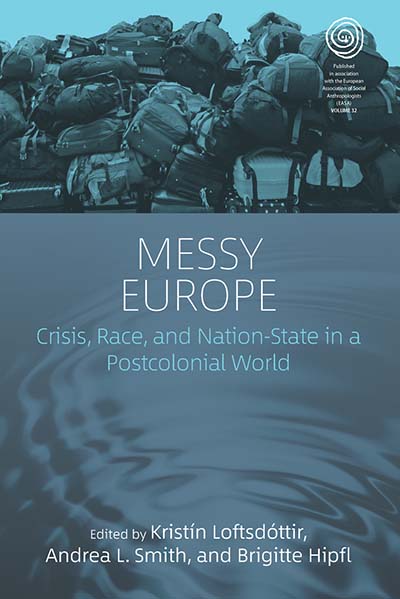“The book is certainly an original contribution to studies of race and racialization. Through the comprehensive analysis of how crisis is entangled in political discourses, rhetoric, and affective experiences of everyday life authors convincingly illustrate what crisis does to contemporary formations of racialization, nationalisms, and national identities.” • Anthropos
“This is a praiseworthy publication. Based on ethnographically rich case studies it provides several snapshots that reach deep down into the heart of the constitution of European societies. They show the diversity and complexity of issues related to identity, social inclusion and exclusion, democratic ideals, the welfare state, mobility and security, cultural fears and certainty, hegemony and legitimacy.” • Anthropological Forum
“The book makes a novel contribution to scholarship on post-integration European identity politics and is crucial reading for scholars interested in crisis and crisis narratives, the anthropology of the state, migration and border politics, and everyday racisms.” • Social Anthropology
“An impressive study on a very timely topic.” • Jeremy MacClancey, Oxford Brookes University
“The contribution to research-based understandings of "crisis talk", "being in a state of crisis", the growing tension between legal and moral obligations, and the intersection of economics and morality is intriguing, critical, urgent, and comes precisely at the right historical conjuncture. The volume is a welcome and thoughtful effort to disentangle what is going on.” • Peter Hervik, Aalborg University
Using the economic crisis as a starting point, Messy Europe offers a critical new look at the issues of race, gender, and national understandings of self and other in contemporary Europe. It highlights and challenges historical associations of Europe with whiteness and modern civilization, and asks how these associations are re-envisioned, re-inscribed, or contested in an era characterized by crises of different kinds. This important collection provides a nuanced exploration of how racialized identities in various European regions are played out in the crisis context, and asks what work “crisis talk” does, considering how it motivates public feelings and shapes bodies, boundaries and communities.
Kristín Loftsdóttir is a Professor at the University of Iceland. She directs the research project “Creating Europe Through Racialized Mobilities” Her research interests include crisis, whiteness, postcolonial Europe, gender, mobility and racism. Her publications include Crisis and Coloniality at Europe’s Margins: Creating Exotic Iceland (2019) and the co-edited Crisis in the Nordic Nations and Beyond (2014) with Lars Jensen.
Andrea L. Smith is Professor in the Department of Anthropology and Sociology at Lafayette College, Pennsylvania. Her interests include postcolonial European social memory, French settler colonialism in Algeria, and race, ethnicity, and place-making. Her publications include the edited volume, Europe’s Invisible Migrants (2003), and the co-authored book, Rebuilding Shattered Worlds: Creating Community by Voicing the Past (2016).
Brigitte Hipfl is Associate Professor in the Department of Media and Communication Studies at the University of Klagenfurt, Austria. She works on media and gender, subject formations, the affective labor of media, and postcolonial Europe, and is currently exploring migration in Austrian cinema and TV. Her publications include Teaching "Race" with a Gendered Edge (2012) co-edited with Kristín Loftsdóttir.
LC: D1056 .M47 2018
BL: DRT ELD.DS.266508
BISAC: SOC002000 SOCIAL SCIENCE/Anthropology/General; POL000000 POLITICAL SCIENCE/General; SOC015000 SOCIAL SCIENCE/Human Geography
BIC: JH Sociology & anthropology; RGC Human geography


